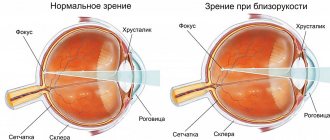Computers, TV and other achievements of modern technological progress, combined with smoking, a sedentary lifestyle, increased environmental pollution, constant lack of sleep and lack of sunlight, spoil our vision.
In addition to a general decrease in visual acuity, the modern generation is plagued by cataracts, glaucoma, and macular degeneration. The 10 most beneficial products for the eyes will help prevent the occurrence of these diseases and prevent the situation from developing into a critical one.
What vitamins are needed to maintain vision?
To decide which foods are good for vision, you need to study the vitamins our visual system needs to maintain normal functioning. Ophthalmologists say that recently the number of patients with myopia and farsightedness has increased significantly. This is due to constant stress, environmental degradation, excessive stress and unbalanced nutrition. Adults, children and teenagers systematically eat fast food - fast food that does not contain vitamins for vision. What vitamins do our visual system need:
- Riboflavin (B2). Strengthens the capillary network of the eye, improves pupil performance, and also prevents the development of glaucoma and cataracts;
- Vitamin A. One of the most important vitamins for the eyes. It strengthens the cornea, improves visual acuity and is responsible for the ability to see in the dark;
- Thiamine (B1). Normalizes intraocular pressure, improves the condition of the pupil and the transmission of nerve impulses from the brain to the visual system;
- Cyanocobalamin (Vitamin B12). Needed for normal blood circulation in the eyes and stabilization of the functioning of nerve fibers;
- Vitamin C. Used to provide oxygen to the visual organs;
- Lutein. This substance helps strengthen the lens and retina.
Lutein
The carotenoid pigment is lutein; it can be found in algae, some microorganisms, plants and flowers. A person must obtain this substance from food, since the body is not able to produce it on its own. Lutein is needed primarily for the eyes, since there is 10,000 times more lutein in the retina than in blood plasma. Regular consumption of it in food helps maintain eye health and improve visual acuity.
The yellow spot, located in the center of the retina, gets its color thanks to lutein. Its derivative zeaxanine can be found in the ciliary body, in the choroid of the eye, in the lens and iris. Thanks to the presence of zeaxanin, the eye filters sunlight, or rather part of it, until it hits the photoreceptors. This helps to increase visual acuity, allowing you to see and examine even the smallest details of the image more clearly.
Another beneficial property of lutein for the eyes is that it acts as a protector of the organ of vision from free radicals and prevents their destructive effect on the retina. The higher the concentration of lutein, the lower the risk of visual impairment due to retinal damage. To replenish reserves, the body needs to receive it from foods in the amount of 5 mg per day.
For this purpose, it is useful to eat (based on 100 grams per mcg):
- Greens such as spinach (11607) and celery (229).
- Vegetables, in particular pumpkin (8173) and carrots (335).
- Green peas (1292) and other legumes (616).
- Fruits, the first place among which is persimmon (346). There is less of it in tangerines and oranges (131 and 113), as well as in peaches (51).
- For eye health, don't forget about corn (356).
- Of animal products, you can consume chicken egg yolk for this purpose (32).
Why is lutein so important?
Replenishing lutein is so important primarily because of the thinning ozone layer of the earth and increased attacks of ultraviolet radiation, which have a detrimental effect on vision.
Working at a computer for long periods of time and watching TV for many hours every day are not beneficial. All this leads to the development of age-related macular degeneration. If previously it affected mainly elderly people, now young people also suffer from this pathology. Therefore, it is so important to consume lutein in sufficient quantities, because it is what protects the retina from dystrophic lesions.
What foods are good for the eyes: berries and vegetables
The main component of most modern vitamin complexes for the eyes is blueberries. This berry protects the organs of vision from fatigue and overstrain, and also helps maintain the health of the capillaries, through which the eye muscles receive all the useful components. Blueberries contain lutein, anthocyanins, and vitamins A and C. They have antioxidant properties and help improve vision clarity. It is enough to eat 1-2 tablespoons of berries (can be frozen). Some people prefer to eat blueberry jam, which is also very good for the eyes.
Ophthalmologists advise eating as many orange and green vegetables as possible.
For example, carrots, which are rich in many vitamins that are beneficial for the eyes. It contains carotene, which in the human body is converted into vitamin A, which plays an important role in maintaining eye health. You can stew carrots with cream or make a salad. These cooking methods improve the absorption of fat-soluble carotene.
To prevent the occurrence of conjunctivitis and dystrophic eye diseases, it is recommended to eat onions and garlic. Vitamins for vision are also found in white, red and cauliflower. It contains vitamins: C and P, B1, B2, PP, as well as the beneficial substance choline. Broccoli helps support vision thanks to lutein, zeaxanthin and caratine. No less useful is spinach, which holds the record for lutein content. Another useful vegetable for the visual system is pumpkin. It contains zinc, zeaxanthin and lutein, as well as a whole range of vitamins. By eating this product, you can significantly reduce the risk of such a serious eye disease as cataracts. new: C, A, B1 and B2. You can prepare various dishes from it: soups, salads, cereals and even sweet desserts.
What berries and vegetables are good for the eyes:
- Blueberry;
- Carrot;
- Onion and garlic;
- Any cabbage (cauliflower, white cabbage, broccoli, etc.);
- Spinach and other greens (parsley, lettuce);
- Pumpkin.
Turmeric and grapefruit. What foods will protect against cancer | Photo gallery
Turmeric. An excellent antioxidant and generally an extremely useful spice. It contains curcumin, which protects cells and has an anti-cancer effect. pixabay.com
Greens with dark leaves. One of the most powerful antioxidants. Greens contain carotenoids, which remove dangerous radicals that cause cancer from the body. Shutterstock.com
Broccoli. And also other types of cabbage. Even 100 grams of broccoli per day can reduce the risk of prostate and lung cancer. pixabay.com
Seaweed. An excellent antioxidant, they enrich the body with iodine and other beneficial substances. Shutterstock.com
Garlic. Effective against intestinal cancer. Moreover, experts recommend consuming it raw. pixabay.com
Onion. Like garlic, it is an excellent antioxidant and prevents primary gene damage leading to the development of cancer. pixabay.com
Tomatoes. Thanks to lycopene, a powerful antioxidant, tomatoes are effective in preventing cancer. Moreover, tomatoes that have undergone heat treatment do not lose their healing properties. pixabay.com
Blueberry. It contains many antioxidants, so blueberries perfectly protect the body's cells. pixabay.com
Raspberries. Like blueberries, raspberries contain ellagic acid, which prevents blood vessels from growing into tumors. pixabay.com
Green tea. One of the most famous antioxidants. It also contains anticarcinogens that prevent the growth of tumors and reduce the risk of their occurrence. Shutterstock.com
Legumes. Soy is considered one of the most useful anti-carcinogenic foods. But other legumes also contain high levels of phytoestrogens, which are effective in preventing certain types of cancer. Legumes are also rich in fiber, which improves digestion and reduces the risk of colon cancer. Shutterstock.com
Nuts. One of the most effective are walnuts. But almonds are also effective in fighting cancer. pixabay.com
Bitter chocolate. Cocoa beans are an excellent antioxidant, so you need to eat chocolate with a minimum sugar content and, of course, not milk, but black. Shutterstock.com
Coffee. Research by American scientists has shown that regular coffee consumption reduces the risk of malignant tumors by 16 percent. pixabay.com
Grapefruit. Vitamin C is one of the best antioxidants. But besides it, grapefruits contain lycopene, a very powerful antioxidant. pixabay.com
Grape. Wine and grapes are some of the best antioxidants. But if scientists are still arguing about the benefits of using the first, then there is no doubt about the need for the second. Grapes contain a large amount of bioflavonoids, which protect the body from various tumors. pixabay.com
Beet. It contains anthocyanins, and in quantities 8 times higher than their content in other vegetables. In addition to anthocyanins, beets contain antioxidants such as vitamin C and betaine. pixabay.com
Olive oil. Thanks to oleic acid, Mediterranean women are much less likely to get breast cancer. pixabay.com
Carrot. Contains provitamin A (carotenoid), which improves visual acuity. When it enters the body, it makes it possible to synthesize vitamin A. This is a fat-soluble vitamin, it is absorbed in the presence of fats. Therefore, you can add cream or milk (but not skim milk!) to carrot juice. Carrot salad must be seasoned with sour cream or butter.
Liver (beef, cod). Source of vitamin A (retinoids). Retinoids are absorbed and act faster than carotenoids. B vitamins, which are also found in the liver, improve the functioning of the optic nerve and help cope with eye fatigue and irritation, for example, when working frequently at the computer.
Article on the topic
Cod has liver. What vitamins have settled there?
Fatty fish (salmon, mackerel, herring). Also contains vitamin A, as well as polyunsaturated fatty acids. Amino acids (tryptophan, lysine, taurine) contribute to the normal functioning of the eyes and nervous system. Fish, especially red fish, helps prevent dry eye syndrome. Regular consumption of fish helps maintain visual acuity in old age, helping to protect against degenerative diseases of the retina. Remember to eat fish 2-3 times a week.
Spinach. Contains lutein, which is beneficial for the lens of the eye. Lutein protects against premature development of cataracts. And in general it acts as an antioxidant, fighting premature cell aging.
Blueberry. Contains vitamins A, group B, C and lutein. Anthocyanins strengthen the capillaries that supply food to the retina and other organs of the eye. In frozen berries, many beneficial properties are preserved. So while it’s not the season yet, you can fully satisfy your need for vitamins using last year’s harvest. No wonder blueberries are included in many dietary supplements and vitamin complexes for the eyes. But it’s still healthier to consume it in its natural form.
From horseradish to carrots. What to eat to strengthen your teeth | Photo gallery
Carrot. As well as celery and other tough vegetables that need to be chewed thoroughly. pixabay.com
Sesame. Champion in calcium and vitamin content. Sesame seeds also remove plaque and strengthen enamel. pixabay.com
Green tea. It contains the substance catechin, which kills bacteria that cause tooth decay. Green tea also freshens breath. pixabay.com
Cheese. Hard cheese contains a lot of calcium and phosphorus. If you eat it instead of dessert, you can significantly help your teeth with beneficial substances, while reducing the amount of sweets. pixabay.com
Onion. Its juice has antibacterial, disinfecting and whitening effects. pixabay.com
Apples. Hard fruits are recommended for strengthening teeth. pixabay.com
Horseradish. Substances that give horseradish a burning taste also prevent the proliferation of bacteria responsible for caries. Shutterstock.com
Parsley. It freshens breath and has an antibacterial effect. Shutterstock.com
Berries. It is believed that the components of berry juices block bacteria from accessing tooth enamel. pixabay.com
Nuts. They contain all the polyunsaturated fatty acids that teeth need. As well as calcium, potassium and phosphorus. Pine nuts help strengthen bone tissue, and cashews prevent the work of bacteria that destroy enamel. pixabay.com
Milk and other dairy products contain vitamins A, D, group B, calcium, magnesium, potassium, which strengthen teeth. pixabay.com
Honey. It is best to use honey in combs. It is effective in the treatment of periodontal disease, dental caries and gum disease. According to scientists, it reduces the amount of enzymes that help bacteria attach to the surface of the tooth. In addition, about a hundred elements have been found in propolis that provide dental protection. pixabay.com
Eggs. They contain vitamin D, which is needed for the production of phosphorus. In addition, if you eat crushed egg shells, you can strengthen your teeth and gums. pixabay.com
What other foods are good for vision?
Nutritionists recommend eating fish at least two to three times a week. And ophthalmologists fully support them in this, because fish contains polyunsaturated fats and fatty acids that are necessary for eye health (especially Omega-3). It is recommended to eat 300 grams of this product twice a week.
To maintain vision, it is necessary to include orange and green fruits such as oranges, grapes, apples and peaches in your usual diet. We recommend paying special attention to grapefruit. It contains special substances that help slow down the aging of the eye lenses, as well as vitamins B, C and A, iron, calcium, potassium, manganese, phosphorus and folic acid.
Those who choose products to improve vision and strengthen retinal tissue should pay attention to pistachios. In addition to phosphorus, fats, potassium and fiber, they contain lutein and zeaxanthin, which the body requires for the normal functioning of the visual system. In addition, dark chocolate has been proven to be beneficial for the eyes. Thanks to the presence of flavonoids, it protects blood vessels and strengthens the cornea.
Ophthalmologists also recommend eating healthy dairy products: milk, kefir, yogurt, fermented baked milk and cottage cheese. They contain a large amount of calcium and beta-carotene, which strengthens the membrane of the eyes and prevents the appearance of various refractive errors.
To improve vision, it is advisable to eat:
- Fish;
- Orange and green fruits;
- Black chocolate;
- Pistachios;
- Eggs;
- Dairy products.
Different products for different eye diseases
Depending on the problem you are facing, it is recommended to consume different foods first.
- If your work involves a lot of stress and your eyes get tired quickly, then parsley and carrot juice will help.
- The vessels will remain elastic and strong if you enrich your diet with apricots, both fresh and in the form of dried fruits or juice; rose hips will also help.
- For myopia, hawthorn and pumpkin are good remedies.
- For the development of cataracts, glaucoma, and optic nerve disease, parsley juice is very useful; one tablespoon per day is enough.
Why aren't blueberries on the list? In addition to the fact that it has a general supportive effect rather than a specific one, this summer berry, like carrots, has recently begun to give way to the benefits of green and yellow foods. This is explained by the fact that the latter contain more lutein and zeaxanthin - pigments that have a positive effect on eye health.
How to keep your eyes healthy?
A balanced diet is the basis for maintaining visual health. However, it is equally important to maintain a sleep schedule and control the amount of visual stress. For those who work at a computer for a long time, ophthalmologists recommend doing eye exercises every 45 minutes. In addition, it is advisable to undergo a systematic examination by an ophthalmologist, since diseases identified in the early stages are much easier to treat. If necessary, the specialist will write a prescription for glasses or contact lenses (for example, Acuvue, Alcon, Adria, etc.), which will help restore clarity of vision.
We recommend that you familiarize yourself with the wide range of products in the Ochkov.Net online store. With us you can profitably order lenses from world brands in just a couple of clicks!
Tips to help maintain eye health throughout your life.
- Don't neglect evening walks before bed. A sufficient amount of oxygen is the key to good blood circulation and, as a result, metabolism.
- While working at the computer and taking breaks, do not go on social networks, but do some eye exercises.
- Remember that every cigarette you smoke has a negative effect on the blood vessels of the fundus.
Beauty and health can be preserved if you approach this comprehensively: a person does not always need to greatly change their lifestyle in order to improve the situation. We all eat healthy foods for the eyes in one way or another. You just need to eat them in sufficient quantities, structure their intake and constantly dilute your diet with fresh fruits and vegetables. With the right approach, your daily diet will improve your health.










